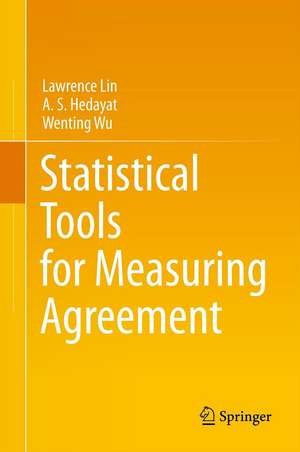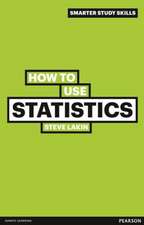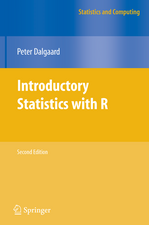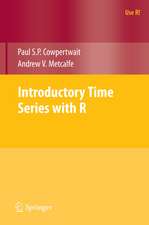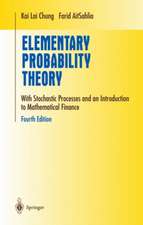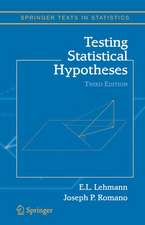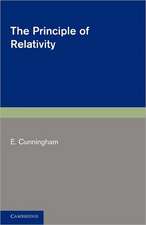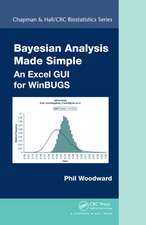Statistical Tools for Measuring Agreement
Autor Lawrence Lin, A. S. Hedayat, Wenting Wuen Limba Engleză Hardback – 18 oct 2011
This book will appeal to a broad range of statisticians, researchers, practitioners and students, in areas of biomedical devices, psychology, medical research, and others, in which agreement assessment are needed. Many practical illustrative examples will be presented throughout the book in a wide variety of situations for continuous and categorical data.
| Toate formatele și edițiile | Preț | Express |
|---|---|---|
| Paperback (1) | 381.43 lei 43-57 zile | |
| Springer – 30 oct 2014 | 381.43 lei 43-57 zile | |
| Hardback (1) | 386.81 lei 43-57 zile | |
| Springer – 18 oct 2011 | 386.81 lei 43-57 zile |
Preț: 386.81 lei
Nou
Puncte Express: 580
Preț estimativ în valută:
74.04€ • 80.45$ • 62.23£
74.04€ • 80.45$ • 62.23£
Carte tipărită la comandă
Livrare economică 21 aprilie-05 mai
Preluare comenzi: 021 569.72.76
Specificații
ISBN-13: 9781461405610
ISBN-10: 1461405610
Pagini: 180
Ilustrații: XVI, 161 p.
Dimensiuni: 155 x 235 x 15 mm
Greutate: 0.39 kg
Ediția:2012
Editura: Springer
Colecția Springer
Locul publicării:New York, NY, United States
ISBN-10: 1461405610
Pagini: 180
Ilustrații: XVI, 161 p.
Dimensiuni: 155 x 235 x 15 mm
Greutate: 0.39 kg
Ediția:2012
Editura: Springer
Colecția Springer
Locul publicării:New York, NY, United States
Public țintă
ResearchCuprins
Introduction.- Continuous Data.- Categorical Data.- Sample Size and Power.- A Unified Model for Coninutous and Categorical Data.- A Comparative Model for Continuous and Categorical Data.- Workshop.
Recenzii
From the reviews:
“Discusses the definitions of and differences between precision, accuracy, and agreement. … As well as definitions and properties, the book includes discussion of sample size and power calculations, and of how to cope with multiple raters and multiple replicates. Each chapter concludes with a useful guide to related publications. This is a nice, concise summary of the area, and one which I shall certainly be recommending to colleagues.” (David J. Hand, International Statistical Review, Vol. 81 (1), 2013)
“Discusses the definitions of and differences between precision, accuracy, and agreement. … As well as definitions and properties, the book includes discussion of sample size and power calculations, and of how to cope with multiple raters and multiple replicates. Each chapter concludes with a useful guide to related publications. This is a nice, concise summary of the area, and one which I shall certainly be recommending to colleagues.” (David J. Hand, International Statistical Review, Vol. 81 (1), 2013)
Notă biografică
Dr. Lawrence I. Lin is Principal Scientist of Baxter International Inc., in the Department of Biostatistics. He is also Adjunct Professor in the Department of Mathematics, Statistics, and Computer Science, University of Illinois at Chicago. More than thirty years consulting experience in clinical trials, research and development (mostly animal toxicity and physiology studies), assay validation and methods comparisons, reliability of products, lab quality control (QC), virus assay and inactivation process, pharmacokinetics, marketing research, litigation, outcome research, product stability, trending of rare events (signal detection), and agreement assessment. His main lines of research include assessment of agreements, surveillance strategies, data transformation, discriminant analysis, design of clinical trials, medical and pharmaceutical statistics, linear and non-linear modeling, and robust statistics. He has published publications over 30 articles to the traditional journals. Dr. Lin is a Fellow of the American Statistical Association, and an elected member of the International Statistical Institute. He has served on as a referee of many international journals including Journal of American Statistical Association, Biometrics, Statistics in Medicines, Communication in Statistics, Journal of Biopharmaceutical Statistics, Journal of Applied Statistics, Journal of Probability and Statistics, to name a few.
Wenting Wu is a lead statistician at Mayo Clinic Cancer Center, and Assistant Professor of Biostatistics in Mayo Clinic Graduate School. Her primary research interests are in the areas of designing clinical trials in cancer and measuring agreements. Areas of active research include randomized phase II trials; meta-analyses; prognostic factor analyses; and clinical efficacy endpoint selections in phase II/III trials. In the last five years, Dr. Wu published more than 40 peer-reviewed articles, 2 book chapters, and more than 20 letters andconference abstracts. In addition, she has served as a statistical reviewer for about 10 international journals.
A.S. Hedayat is Distinguished Professor of Statistics and Senior Scholar in the Department of Mathematics, Statistics, and Computer Science, University of Illinois at Chicago. His main lines of research and statistical consulting include design of experiments, medical and pharmaceutical statistics, environmental statistics, forensic statistics, surveillance strategies, assessment of agreements, and survey sampling. In addition to the traditional journal publications of over 160 articles he has also co-authored three books on statistics. Professor Hedayat is a Fellow of the Institute of Mathematical Statistics, a Fellow of the American Statistical Association, and an elected member of the International Statistical Institute. He has served on the editorial boards of many international journals including The Annals of Statistics, American Statistical Association, and The American Statisticians and the Bulletin of Iranian Mathematical Society.
Wenting Wu is a lead statistician at Mayo Clinic Cancer Center, and Assistant Professor of Biostatistics in Mayo Clinic Graduate School. Her primary research interests are in the areas of designing clinical trials in cancer and measuring agreements. Areas of active research include randomized phase II trials; meta-analyses; prognostic factor analyses; and clinical efficacy endpoint selections in phase II/III trials. In the last five years, Dr. Wu published more than 40 peer-reviewed articles, 2 book chapters, and more than 20 letters andconference abstracts. In addition, she has served as a statistical reviewer for about 10 international journals.
A.S. Hedayat is Distinguished Professor of Statistics and Senior Scholar in the Department of Mathematics, Statistics, and Computer Science, University of Illinois at Chicago. His main lines of research and statistical consulting include design of experiments, medical and pharmaceutical statistics, environmental statistics, forensic statistics, surveillance strategies, assessment of agreements, and survey sampling. In addition to the traditional journal publications of over 160 articles he has also co-authored three books on statistics. Professor Hedayat is a Fellow of the Institute of Mathematical Statistics, a Fellow of the American Statistical Association, and an elected member of the International Statistical Institute. He has served on the editorial boards of many international journals including The Annals of Statistics, American Statistical Association, and The American Statisticians and the Bulletin of Iranian Mathematical Society.
Textul de pe ultima copertă
Agreement assessment techniques are widely used in examining the acceptability of a new or generic process, methodology and/or formulation in areas of lab performance, instrument/assay validation or method comparisons, statistical process control, goodness-of-fit, and individual bioequivalence. Successful applications in these situations require a sound understanding of both the underlying theory and methodological advances in handling real-life problems. This book seeks to effectively blend theory and applications while presenting readers with many practical examples. For instance, in the medical device environment, it is important to know if the newly established lab can reproduce the instrument/assay results from the established but outdating lab. When there is a disagreement, it is important to differentiate the sources of disagreement. In addition to agreement coefficients, accuracy and precision coefficients are introduced and utilized to characterize these sources.
This book will appeal to a broad range of statisticians, researchers, practitioners and students, in areas of biomedical devices, psychology, medical research, and others, in which agreement assessment are needed. Many practical illustrative examples will be presented throughout the book in a wide variety of situations for continuous and categorical data.
This book will appeal to a broad range of statisticians, researchers, practitioners and students, in areas of biomedical devices, psychology, medical research, and others, in which agreement assessment are needed. Many practical illustrative examples will be presented throughout the book in a wide variety of situations for continuous and categorical data.
Caracteristici
Appeals to a broad range of statisticians, researchers, practitioners, and students in areas of biomedical devices, psychology, and medical research, in which agreement assessment are needed Considers un-scaled (absolute) and scaled (relative) agreement statistics for both continuous and categorical variables Many practical examples will be presented throughout the book in a wide variety of situations for continuous and categorical data Includes supplementary material: sn.pub/extras
